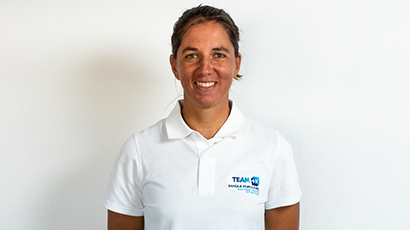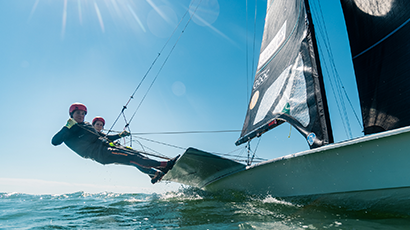
Charline Picon, sailing: “It was no easy matter to start a new discipline from scratch…”
Wednesday 26 June 2024
Charline Picon, 39, a double Olympic medalist supported by Banque Populaire Aquitaine Centre Atlantique, will be one of the great French sailing champions competing at the Olympic Games Paris 2024.
What an incredible career! For several reasons: first, because after competing in her first Olympic Games in London (where she came in 8th), she went on to win gold in Rio in 2016, and then silver in Tokyo in 2021 in windsurfing (RS:X class) and, second, because she managed the incredible feat of qualifying for the Olympic Games Paris 2024 in a different discipline, the 49erFX (a two-person dinghy that is quite… acrobatic!). We take a closer look at this atypical sportswoman who rose to a challenge that very few champions before her have ever dared to accept.
How has your life been changed by sport?
I started windsurfing at the age of eleven in La Tremblade (a town on the Atlantic coast in the Charente-Maritime department in southwestern France) and fell in love with the discipline. And then, as the years went by, I entered competitions, and windsurfing started to play an increasingly important role in my life… But it never crossed my mind at that time that it would become as important as it has… that it would become my profession! I was thinking more of pursuing a career in the health sector. After graduating from high school, I was offered a place to study medicine, which meant giving up windsurfing. In the end, I opted for physiotherapy, which enabled me to follow a flexible study program, although this wasn’t an automatic choice by any means. But it did allow me to pursue my sporting career. But the outcome was that it took me six years to obtain my physiotherapy diploma instead of three. And before the Tokyo Olympics, I set up with my partner my own physiotherapy practice, focusing on sports physiotherapy.
How did the transition to the elite level go?
In the youth categories, things went very well, I got good results at the World Championships, even though my future wasn’t very clear when I took my baccalaureate. Then, in 2005, there was that change in the rules when the Mistral board was replaced in the Olympic program by the RS:X. That put everyone back to square one, owing to the fact that the older competitors had less of an advantage from a technical point of view. And in 2006, I became one of the top 8 competitors worldwide. It was a major milestone in my life. I could even have qualified for Beijing in 2008, where I ended up as a substitute…
You won Olympic gold in Rio in 2016, you were the Olympic silver-medalist in Tokyo in 2020 and then, for this Olympiad, when your class of windsurfing equipment was replaced by a new class, you set yourself a crazy challenge: to qualify for the Olympic Games Paris 2024 in the 49erFX event… In other words, to switch from windsurfing to dinghy sailing… and lose your status as a global champion in one discipline and become a “novice” in another. It’s very rare for someone to accept such a huge demotion!
Yes, you can put it like that. I learned to sail a boat; I literally had to “learn the ropes” as I didn’t even know the names of the different parts of the rigging… So I had to let go of certain things I knew, like tactics for example, even though this was an area where I was pretty good. But my thoughts were so absorbed just by learning all the technical terms that I didn’t have time to think about tactics. It was a real departure from my comfort zone. It meant starting from scratch which wasn’t easy for a variety of reasons. It was clearly the most difficult Olympiad for me. But it’s an adventure that enables you to continue your personal growth…
In terms of self-esteem alone, it must have been pretty hard to live with. You were at the top of your game but you accepted to be a “simple beginner” and start all over again. Few champions are capable of doing that…
I was encouraged by my results and just focused on what was, for me, an unknown discipline. Of course, going back to basics isn’t easy when it comes to self-esteem. But I’m proud to have stuck with it and carried it through to the end. Sarah Steyaert and I are where we wanted to be: at the Olympic Games Paris 2024 as outsiders.
Yes, but you were usually the favorite…
I liked being the favorite, but it’s true that being an outsider is a more comfortable experience. The biggest challenge was to switch from an individual sport to a team sport, with all the human aspects entailed by such a change. Onboard communication is quite a challenge, but it’s a very enriching experience because the need to communicate is universal. The source of problems and misunderstandings in any environment can often be traced back to poor communication. My husband and I talk about this in our physiotherapy practice, for example… You have to say things to each other. On a boat, it’s a major issue. We all have our ego, that constant need to be right, it’s exhausting… But to be effective, you have to put your ego aside sometimes… For example, it’s not easy to share an intuition, you mustn’t make the other person doubt themselves…

“I’m proud to have stuck with it and carried it through to the end.
Sarah Steyaert and I are where we wanted to be: at the Olympic Games Paris 2024 as outsiders.”
Tell us about your helmswoman, Sarah Steyaert (37), the other member of the “Mama team” who came 6th in Rio in 2016 in the 49erFX event…
Bringing together two big names in sailing seemed like the right choice. What’s more, we’re both mothers. Sarah knew that I had Olympic experience as a mother, so we have the same constraints, such as not being able to be away for long periods of time. We understand the problems we both share. If one of us is finding things difficult at home, the other can empathize perfectly.
What’s your favorite sporting memory?
The gold medal won by Faustine Merret in 2004. I was working as a sailing instructor at La Tremblade at the time, so I was really looking forward to it. Then Julien Bontemps’ medal in Beijing. I’ve been passionate about the Olympic Games ever since I started following them for the first time in 1996.
What do you like about your discipline, and why is it so special?
There’s that feeling of freedom on the water and that gliding sensation. There’s also the fact that it’s an outdoor sport. In windsurfing, my original discipline, there’s a physical and technical dimension with that special glide, which was one of my strong points. While you’re making this physical effort, you also have to make a complete analysis of the situation. You have to take account of every cloud, every chop of the waves, every ripple in the water. And then choose your best option depending on what your opponents are doing. That’s why it’s a sport where you need to be mature because of this need for analysis… but it’s not limited to that. You can analyze the situation to perfection, just like a computer, but experience is the key to knowing when and where to tack. Because you never encounter the same scenario twice in this sport, you never have the same sea, the same weather, the same wind with the same opponents.
What do you think about when you doubt yourself?
I think about the final goal… At times when I wanted to stop, I imagined myself at the end of this adventure with a medal… If I stopped, I’d never know whether I could make it happen. So I kept going… just to find out.
What’s your main strength?
I’m intuitive by nature and I have a strong feel for the water. On the board, I had a good sense of glide…. and with time, a sense of adaptation too. The Covid epidemic helped me change. Before, I planned everything in advance. With the Covid crisis, I had to improvise, adapt, and change plans to such an extent that, now, when I’m faced with imponderables, I’m more relaxed, free of stress.
Could you describe one of your typical days?
When I’m not training, I take my daughter Lou to school – she’s in first grade – and then I go to the gym for weight training. Then I have a lunch break, a nap, before doing some administrative work… In sailing, you don’t get help to set up a project. You have to juggle multiple roles as a mother, a sportswoman, a manager, a specialist in logistics, etc. After that, I go and train at the specialized training center in La Rochelle. And at the end of the day, I go to pick my daughter up from school.
Are you planning to take your family on a round-the-world trip after the Olympic Games?
Yes, it’s a big project we organized last year. We recently bought a catamaran. It’s all about spending time together. I spent seven years with my daughter on a part-time basis. Lou needs her mom… and so does my partner. It’s a project that’s also related to the environment, which will also be the subject of a film.
What do the Olympic Games Paris 2024 mean for your career, and how are you preparing for them?
Very few athletes have the chance to experience the Games in their own country… So I’m going to concentrate on living in the present moment…
If you had to mention one sporting value that you hold particularly dear?
Humility. Firstly, because you’re up against the natural elements. And secondly, because just because you win titles and medals doesn’t mean you should get a big head and lose sight of who you are. That’s my guiding principle, to remain myself.
How important is the support of your partner Banque Populaire Aquitaine Centre Atlantique in your life as an elite sportswoman?
It’s essential, because even if we receive help from the Federation, our projects are expensive. A boat costs 35,000 euros… you need partners to prepare these projects in the best possible conditions…
Charline Picon is also supported by the Groupe BPCE. She is an athlete ambassador for the collective of nearly 250 athletes and para athletes supported by the Group’s companies.
To discover which athletes, para athletes and teams supported by Groupe BPCE companies will be competing at Paris 2024: